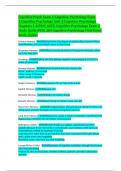Exam (elaborations)
Cognitive Psych Exam 1:Cognitive Psychology Exam 2:Cognitive Psychology Unit 3:Cognitive Psychology Chapters 1-6:PSYC 4455) Cognitive Psychology Exam 3 Study Guide:PSYC 364 Cognitive Psychology Final Exam Study Guide.
- Module
- Institution
- Book
Cognitive Psych Exam 1:Cognitive Psychology Exam 2:Cognitive Psychology Unit 3:Cognitive Psychology Chapters 1-6:PSYC 4455) Cognitive Psychology Exam 3 Study Guide:PSYC 364 Cognitive Psychology Final Exam Study Guide.
[Show more]



